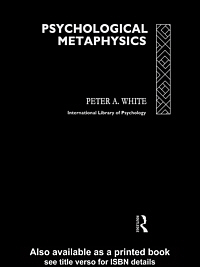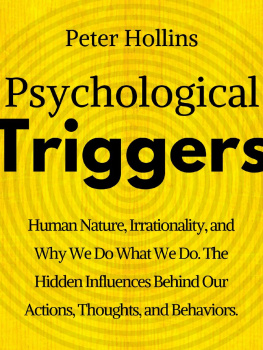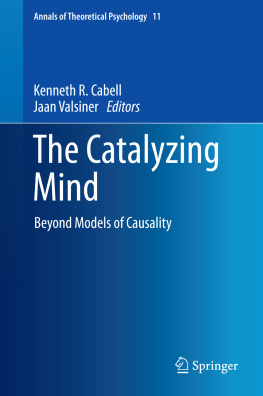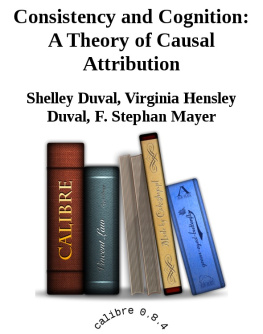Cover

| title | : | Psychological Metaphysics International Library of Psychology |
| author | : | White, Peter A. |
| publisher | : | Taylor & Francis Routledge |
| isbn10 | asin | : |
| print isbn13 | : | 9780203419014 |
| ebook isbn13 | : | 9780585448954 |
| language | : | English |
| subject | Social perception--Philosophy, Metaphysics--Psychological aspects, Knowledge, Sociology of, Attribution (Psychology) , Concepts, Psychology--Philosophy |
| publication date | : | 1993 |
| lcc | : | BF323.S63.W48 1993eb |
| ddc | : | 150/.1 |
| subject | : | Social perception--Philosophy, Metaphysics--Psychological aspects, Knowledge, Sociology of, Attribution (Psychology) , Concepts, Psychology--Philosophy |
Page i
Psychological metaphysics
The research literature on causal attribution and social cognition generally consists of many fascinating but fragmented and superficial phenomena. These can only be understood as an organised whole by elucidating the fundamental psychological assumptions on which they depend. Psychological Metaphysics is an exploration of the most basic and important assumptions in the psychological construction of reality, with the aim of showing what they are, how they originate, and what they are there for.
Peter A.White proposes that people basically understand causation in terms of stable, specific powers of things operating to produce effects under suitable conditions. This underpins an analysis of peoples understanding of causal processes in the physical word and of human action, which makes a radical break with the Heiderian tradition.
Psychological Metaphysics suggests that causal attribution is in the service of the persons practical concerns and any interest in accuracy or understanding is subservient to this. A notion of regularity in the world is of no more than minor importance in causal attribution, and social cognition is not so much a matter of cognitive mechanisms or processes but more of cultural ways of thinking imposed upon tacit, unquestioned, universal assumptions.
Psychological Metaphysics incorporates not only research and theory in social cognition and developmental psychology, but also philosophy and the history of ideas. It will be challenging to everyone interested in how we try to understand the world.
Peter A.White is a Lecturer in Psychology at the University of Wales College of Cardiff.
Page ii
International Library of Psychology
A Transformational Theory of Aesthetics
Michael Stephan
Inference and Understanding
A Philosophical and Psychological Perspective
K.I.Manktelow and D.E.Over
Selective Attention in Vision
A.H.C.van der Heijden
Classroom Non-Verbal Communication
Sean Neill
Page iii
Psychological metaphysics
Peter A.White

London and New York
Page iv
First published in 1993
by Routledge
11 New Fetter Lane, London EC4P 4EE
This edition published in the Taylor & Francis e-Library, 2003.
Simultaneously published in the USA and Canada
by Routledge
29 West 35th Street, New York, NY 10001
1993 Peter A.White
All rights reserved. No part of this book may be reprinted
or reproduced or utilized in any form or by any
electronic, mechanical, or other means, now known or
hereafter invented, including photocopying and
recording, or in any information storage or retrieval
system, without permission in writing from the
publishers.
British Library Cataloguing in Publication Data
A catalogue record for this book is available from the British Library.
Library of Congress Cataloging in Publication Data
White, Peter A. (Peter Anthony), 1954
Psychological metaphysics/Peter A.White
p. cm.(International library of psychology)
Includes bibliographical references and index.
1. Social PerceptionPhilosophy. 2. MetaphysicsPsychological
aspects. 3. Knowledge, Sociology of. 4. Attribution (Psychology)
5. Concepts. I. Title. II. Series.
BF323.S63.W48 1993
150.1dc20 9224480
CIP
ISBN 0-203-41901-4 Master e-book ISBN
ISBN 0-203-30863-8 (OEB Format)
ISBN 0-415-08331-1 (Print Edition)
Page v
For Sara
Page vi
This page intentionally left blank.
Page vii
Contents
List of figures and tables | viii |
Preface | ix |
| Introduction to psychological metaphysics | |
Part 1
General psychological metaphysics |
| Practical concerns and lay judgement | |
| The nature of basicity in the psychological construction of reality | |
| Foundations: basic categories and basic particulars | |
| Why regularity information is not basic to causal understanding | |
| The causal powers theory of causal processing | |
| Origins and development of basic causal concepts | |
Part 2
Psychological metaphysics of the physical world |
| Fundamental assumptions about the nature of order in the physical world | |
| Causal relations in the physical world | |
| Causal order in nature | |
Part 3
Psychological metaphysics of the mind |
| The concept of action | |
| Formation of beliefs about the mind | |
| Implications for research in causal attribution | |
| The battleground of the mind | |
| Judgement and feelings | |
Summary and comments | |
References | |
Name index | |
Subject index | |
Page viii
Figures and tables
FIGURES
3.1 | Hypothetical construction of reality showing relations of existential dependence | |
8.1 | Diagram of levels in the natural order | |
10.1 | The causal hierarchy, study 1 | |
10.2 | The causal hierarchy, study 2 | |
15.1 | Schematic diagram of types of judgemental sequence |
Next page










